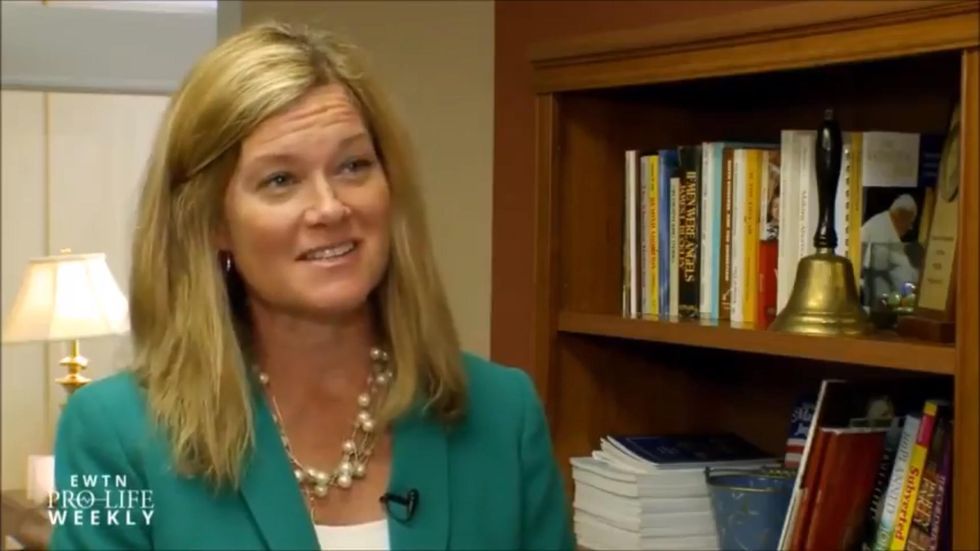
Jeanne Mancini is the president of the March for Life, which organizes a large pro-life rally each January in Washington D.C. (Image source: EWTN screenshot)

TheBlaze will be featuring regular interviews with newsmakers that we think would be of interest to our readers. As part of this ongoing series, we sat down with Jeanne Mancini, the president of the March for Life.
Mancini was appointed as president of the March for Life in 2012. Before that, she worked at the Family Research Council as a policy expert focusing on abortion, women's health, and end-of-life issues.
The first March for Life was held Jan. 22, 1974, the one-year anniversary of the Supreme Court's Roe v. Wade decision that legalized abortion in the United States. Since then, the march has been held every January in Washington, D.C.
***************
When did you decide that you wanted to work in politics?
In 2006, I attended the U.N. Commission on the Status of Women and saw firsthand just how relentlessly policies that would negatively impact women were being advocated for in the name of the common good. I was deeply distressed over the confusion being sown by their messaging, started to understand how these policies ultimately do women more harm than good. It was after this experience that I felt a call to work as an advocate on behalf of women, especially as it pertains to protecting their inalienable dignity and the sanctity of nascent life.
You're obviously passionate about fighting for the unborn. Have you always felt this way?
After college, I did a year of volunteer service with the Jesuit Volunteer Corps and worked with adolescents that had undergone tremendous abuse and neglect. It was during this time I grappled with questioning whether these children should have to be born into such traumatic circumstances, and came to realize that a person’s life has inherent value regardless of difficulties encountered. Coupled with my later experiences and formation, this paved the way to turning my personal passion into a vocation to work with the pro-life community in promoting a culture of life.
Your organization hosts the March for Life once a year in January. So what does your average workday look like in June?
We are very active year-round! With an amazing but lean staff of seven, my major responsibilities include management, strategic planning, development, and communications. I can have six meetings related to all of these topics in just one day, in addition to answering emails, phone calls, etc.
This year saw the 45th annual March for Life in Washington, D.C. After 45 years, what do you think that the march has accomplished?
The March for Life has become the largest annual civil rights demonstration worldwide, with a majority of participants being young people. The number of abortions is decreasing, abortion clinics are decreasing, public opinion is leaning towards life — Marist polling continues to show a large majority of Americans would limit abortion at most to the first three months of pregnancy, and now more than ever we see young people as the pro-life generation! This year we had the president of the United States addressed marchers, and have seen this administration enact numerous positive policies protecting the unborn.
That being said, our goal is to create a culture where abortion is unthinkable. While the abortion rate is down, the reality that nearly 1 million children are destroyed by abortion every year. Clearly we still have our sometimes daunting yet critically necessary work cut out for us.
What do you think is the biggest pro-life fight going on right now?
The fight in each of our hearts. We are steeped in a culture of violence constantly surrounded by death. The nearly 1 million developing babies who are snuffed out by abortion each year is only a small facet of it. Culture is a reflection of its people. It can reflect violence or it can reflect love. Our theme for the March for Life this year — “Love Saves Lives” — sought to be a reminder that only when we each respond to this call to love our neighbor, both in the womb and around us, will we restore a culture of life.
Who do you see as some of the biggest pro-life leaders in the movement right now?
On the national level there are so many great leaders, however, with the work we do, I am blessed to meet local leaders who inspire us all. People like Center for Arizona Policy President Cathi Herrod; Susan Gallucci, who runs the Northwest Center here in D.C.; and my friend Therese Bermpohl, who runs a diocesan program on life, marriage, and family. These are the people who are on the front lines and put the best foot forward for the pro-life movement.
What's your favorite thing to do when you're not working?
Spending time with my family and friends, getting outside — preferably hiking — or making a nice leisurely meal.